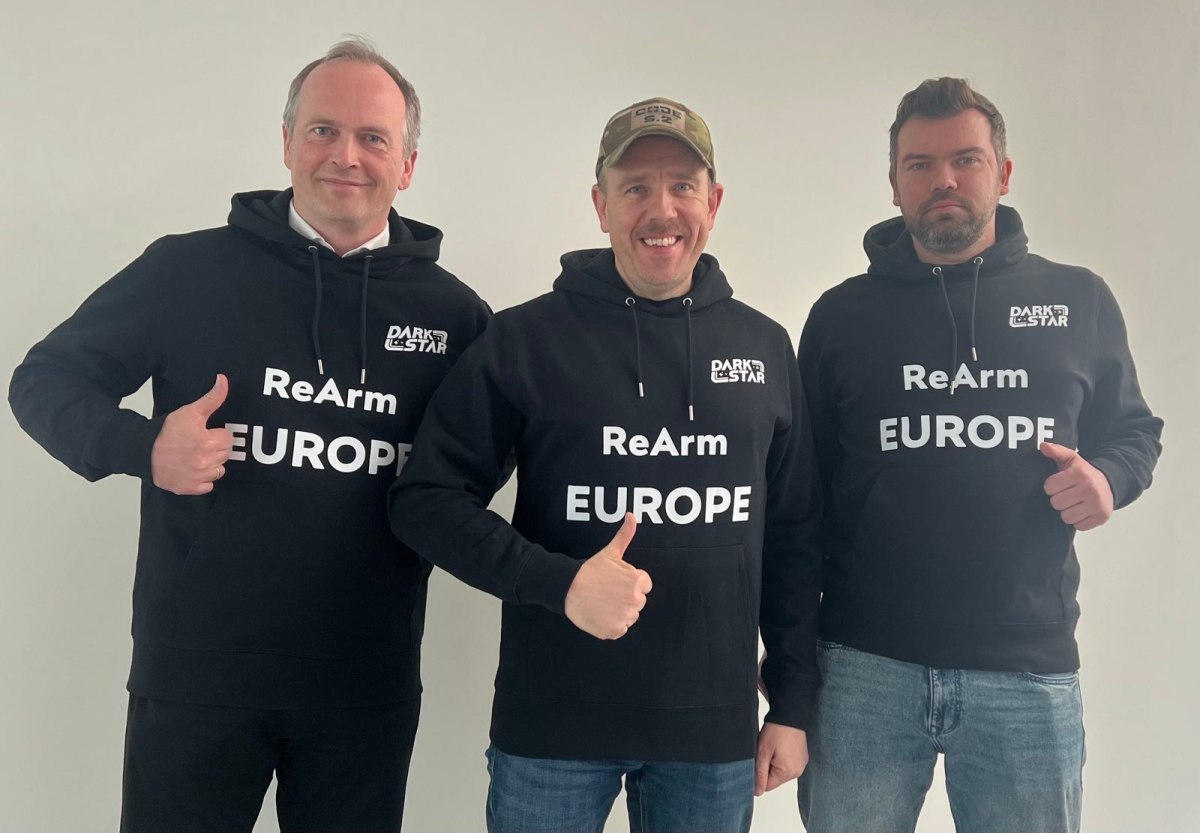Defense tech has gone from a no-go zone for VCs to a hot investment sector. However, dual use — meaning that the technology must also have civilian applications — is still a requirement for most of them, including the NATO Innovation Fund.
Estonian VC firm Darkstar breaks from this trend by investing in purely military applications, with the goal of helping rearm Europe using combat-proven solutions emerging from Ukraine. “This is very critical, not only today but for the next 10 years,” said its cofounder and general partner Ragnar Sass (second from the left in the picture).
The firm takes a hands-on approach to this mission, helping startups bring products to military customers both in Ukraine and throughout Europe. For Ukrainian teams, this means not just funding but also support with setting up compliant entities in NATO countries like Estonia. “In any company which wants to be part of European procurement or even grants, the operational side has to be perfect,” Sass said.
With a fundraising target of €25 million (approximately $29.2 million) in the next six to 12 months, Darkstar intends to focus on pre-seed and seed rounds, with a usual check size of €500k to €1 million. It has already made two investments: in Ukrainian-Estonian startups FarSight Vision, which specializes in geospatial analytics and 3D mapping for drone pilots, and Deftak, which develops ammunition for drones.
For Sass, investing in weapons wasn’t an obvious move. A key figure in the Estonian startup ecosystem ever since Skype’s founders funded his first startup, a community for pet owners, he went on to co-found CRM and sales tool Pipedrive, and used the proceeds of that unicorn-sized exit to make more than 50 angel investments.
Some of these investments became unicorns, too, including Veriff. But none of them were in defense, even after Russia’s full-scale invasion of Ukraine in 2022 prompted Sass to deliver trucks and aid to Ukraine, to which he has personal and business ties.
“It took quite a long time mentally to understand that I want to be involved in weapon systems,” Sass said. He eventually made his choice a year and a half ago when Estonian drone startup Krattworks became his first defense investment.
Krattworks marked a turning point for Sass; it was also his last investment as an angel investor. Sass is now putting his money into Darkstar, which started out as a coalition organizing hackathons and bootcamps, leveraging his decade-long experience at hackathon community Garage48 between 2010 and 2020. Since then, Sass went on to fund and sell another company, Salto X, although it is unclear whether he made money from that exit.
Sass isn’t the only one backing this approach. Fifteen-month-old Darkstar just completed a first close of €15 million (approximately $17.5 million) backed by European entrepreneurs, family offices, and Estonian state-backed LP SmartCap, TechCrunch learned exclusively.
Backing a fund like Darkstar makes SmartCap an exception as well, alongside Lithuania’s sovereign VC fund Coinvest Capital, which became authorized to make defense investments without requiring civilian use cases in 2023. It’s no coincidence that all of these come from the Baltics.
Russia’s proximity and the Soviet Union’s former occupation give Estonians like Sass a sense of urgency that is now spreading across Europe as investors recognize the importance of defense. “But if you don’t have real know-how in that area, you’re struggling,” Sass said. For Darkstar, building that know-how meant talking to end users from day one.
In Darkstar’s case, the end users are Ukraine’s brigades. While some changes are being implemented, the country has adopted a decentralized approach, enabling combat units to make their own decisions. This can be hard to navigate for outsiders, but Sass got a head start.
“In the last three and a half years, I have been to Ukraine 20-plus times, and I have personally met 100-plus unit commanders — spent time with them, talked with them, learned from them,” said the entrepreneur, who also found a lot of common ground. “Elite units are more similar to startups than we can imagine.”
Although cheap first-person view (FPV) drones have been used to destroy equipment worth millions, Sass says that it would be a huge mistake to think that tech developments from Ukraine are easily copyable. There’s sophistication — “most elite drone battalions in Ukraine have their own R&D” — and there is velocity on both sides of the frontline. For instance, fiber-optic drones have been a game changer.
For startups outside of Ukraine, it means that a solution that works on paper could become pointless, and that’s where Darkstar’s bootcamps are meant to help. The next one will take place this summer in Kyiv, and according to its website, will give companies “feedback, field-testing opportunities and combat validation.”
Some of Darkstar’s deal flow will come from its bootcamps, where staff work hands-on with teams for five days. But the pipeline is broader, and Ukraine’s 2,000 eligible teams stand out. “Many of the Ukrainian companies we are looking at are not six months old; they have been around two-plus years and they have already managed to build a product and company with minimum capital.”
General mobilization of Ukrainian men isn’t as big an obstacle as often assumed. Founders building effective combat products can receive exemptions and travel approval, and a significant percentage of Ukraine’s defense startup founders are women, including FarSight Vision CEO, Viktoriia Yaremchuk, Sass said. As for the restriction on defense tech exports out of Ukraine, that hurdle is in the process of being removed.
Sass is applying a similar location philosophy to defense investing. Just as he once argued that “early-stage Nordic startups should cut the crap and move to Silicon Valley,” Darkstar won’t invest in companies that intend to stay based exclusively in Ukraine. It is also talking to teams based in Central and Eastern Europe, Latvia, the U.K. and Germany, among others. “After a year or two, this [portfolio] will be a way more diverse and mixed group.”
In alignment with this goal, Darkstar describes itself as pan-European in background. Sass is joined by Estonia-based GPs Kaspar Gering, who spent a decade at Wise in engineering and data science roles, and Mart Noorma, director of the NATO Cooperative Cyber Defence Centre of Excellence (on the left in the main picture). A fourth GP, Philip Jungen, is based in Germany, with another partner and additional staffers in Ukraine.
As for categories, Darkstar plans to invest in autonomous systems, air defense, electromagnetic warfare, communications, cybersecurity, sensors, as well as surveillance and intelligence, both with single and dual uses.
According to Sass, some of these could turn into acquisition targets for cash-rich prime contractors struggling to deliver the rapid solutions that NATO countries are now willing to buy from them. But fueled by governments coming to terms with how the war in Ukraine has transformed modern warfare, other startups could also reach hundreds of million in revenue on their own and even go public.
It is unclear whether defense startups, particularly those without civilian applications, can achieve breakout success on their own. However, the rapid rise and valuation of companies like Anduril and Helsing along with a wave of new defense-focused funds, suggests that the prospect of venture-scale returns is being taken more seriously.
Either way, what keeps Sass going is something bigger. Though he embraces the humor of NAFO, a global online movement leveraging memes to support Ukraine, Sass also delivers a sober warning about Russia’s relentless war economy. “The enemy is moving very fast, and that’s exactly why I believe that we need to have the tech community being involved way more to address that huge and growing threat.”




